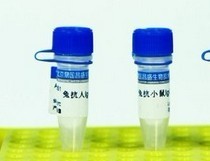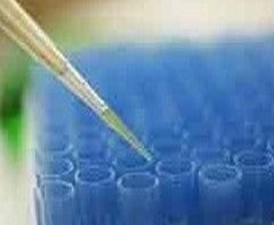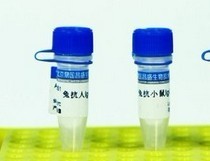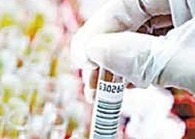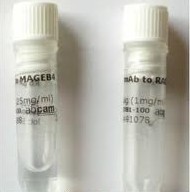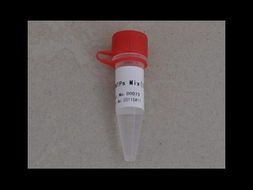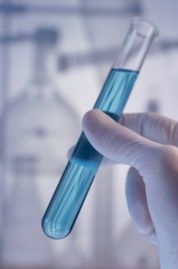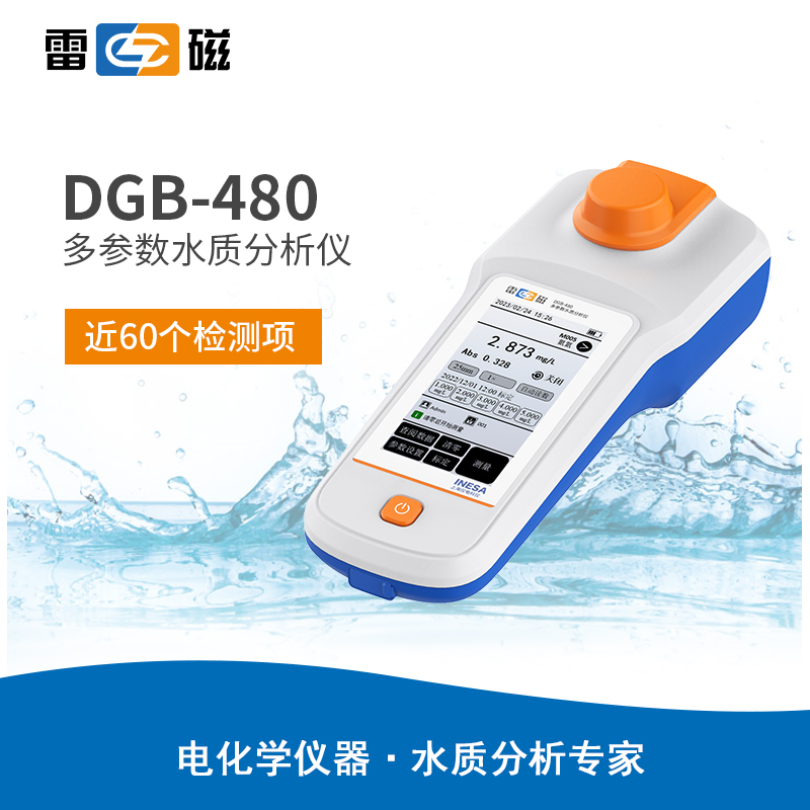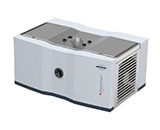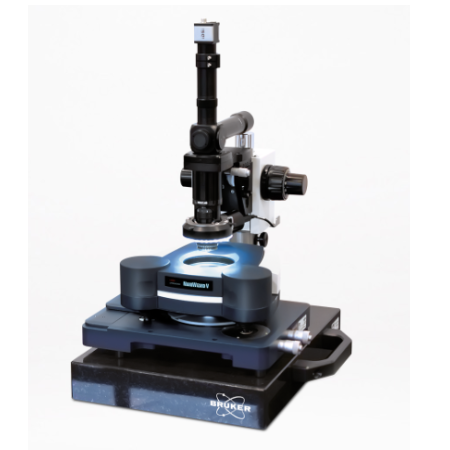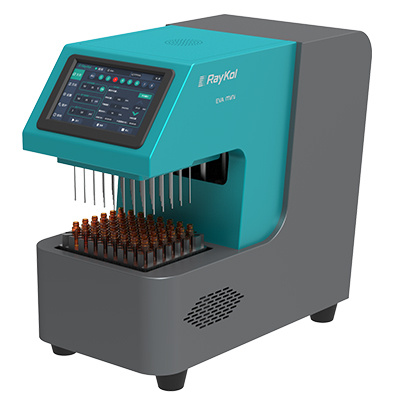公司蛋白C抑制因子抗体具有高纯度、高效价、高特异性的特点,仅用于科学研究,不可用于临床诊断及药物治疗,可以应用于多种实验。CST、Santa抗体品牌。
英文名称 Anti-Protein C inhibitor/SerpinA5
中文名称 蛋白C抑制因子抗体
别 名 Acrosomal serine protease inhibitor; IPSP; PAI 3; PAI3; PCI; PLANH 3; PLANH3; Plasma serine protease inhibitor; Plasminogen activator inhibitor 3; Plasminogen activator inhibitor III; PROCI; Serpin A5; Serpin peptidase inhibitor clade A (alpha 1 antiproteinase antitrypsin) member 5; Serpin peptidase inhibitor clade A member 5; SerpinA5; IPSP_HUMAN.
浓 度 1mg/1ml
规 格 0.1ml/100μg 0.2ml/200μg
蛋白C抑制因子抗体 的相关产品:
RASL/RASL10A Ras样蛋白家族10A抗体 0.2ml
RASSF1A Ras相关区域家族1A抗体 0.1ml
RASSF2 Ras相关结构域蛋白质2抗体 0.2ml
蛋白C抑制因子抗体抗体来源 Rabbit
克隆类型 polyclonal
交叉反应 Human, Mouse, Rat, Chicken, Dog, Cow, Sheep
产品类型 一抗
研究领域 肿瘤 心血管 免疫学 细胞凋亡
蛋白分子量 predicted molecular weight: 43kDa
性 状 Lyophilized or Liquid
免 疫 原 KLH conjugated synthetic peptide derived from human Protein C inhibitor
亚 型 IgG
纯化方法 affinity purified by Protein A
储 存 液 0.01M PBS, pH 7.4 with 10 mg/ml BSA and 0.1% Sodium azide
产品应用 WB=1:100-500 ELISA=1:500-1000 IP=1:20-100 IHC-P=1:100-500 IHC-F=1:100-500 IF=1:100-500
(石蜡切片需做抗原修复)
not yet tested in other applications.
optimal dilutions/concentrations should be determined by the end user.
保存条件 Store at -20 °C for one year. Avoid repeated freeze/thaw cycles. The lyophilized antibody is stable at room temperature for at least one month and for greater than a year when kept at -20°C. When reconstituted in sterile pH 7.4 0.01M PBS or diluent of antibody the antibody is stable for at least two weeks at 2-4 °C.
Important Note This product as supplied is intended for research use only, not for use in human, therapeutic or diagnostic applications.
产品介绍 Protein C Inhibitor (PCI), a member of the serine protease inhibitor (serpin) superfamily, is abundant in plasma and other body fluids. Protein C Inhibitor inhibits a number of "arginine specific" serine proteases of the coagulation and fibrinolytic systems (including thrombin, trypsin, and activated Protein C), as well as plasma and tissue kallikreins and the sperm protease acrosin. This inhibition is regulated by glycosaminoglycans, such as heparin and heparan sulphate, and several polyanions. As well as its roles in the regulation of hemostasis and fertilisation, Protein C Inhibitor is involved in cell inflammation, proliferation, apoptosis, tumour cell migration, invasion, and metastasis. Recent studies have demonstrated an association between Protein C Inhibitor and multiple sclerosis lesions.
Function : Heparin-dependent serine protease inhibitor acting in body fluids and secretions. Inactivates serine proteases by binding irreversibly to their serine activation site. Involved in the regulation of intravascular and extravascular proteolytic activities. Plays hemostatic roles in the blood plasma. Acts as a procoagulant and proinflammatory factor by inhibiting the anticoagulant activated protein C factor as well as the generation of activated protein C factor by the thrombin/thrombomodulin complex. Acts as an anticoagulant factor by inhibiting blood coagulation factors like prothrombin, factor XI, factor Xa, plasma kallikrein and fibrinolytic enzymes such as tissue- and urinary-type plasminogen activators. In seminal plasma, inactivates several serine proteases implicated in the reproductive system. Inhibits the serpin acrosin; indirectly protects component of the male genital tract from being degraded by excessive released acrosin. Inhibits tissue-and urinary-type plasminogen activator, prostate-specific antigen and kallikrein activities; has a control on the sperm motility and fertilization. Inhibits the activated protein C-catalyzed degradation of SEMG1 and SEMG2; regulates the degradation of semenogelin during the process of transfer of spermatozoa from the male reproductive tract into the female tract. In urine, inhibits urinary-type plasminogen activator and kallikrein activities. Inactivates membrane-anchored serine proteases activities such as MPRSS7 and TMPRSS11E. Inhibits urinary-type plasminogen activator-dependent tumor cell invasion and metastasis. May also play a non-inhibitory role in seminal plasma and urine as a hydrophobic hormone carrier by its binding to retinoic acid.
Subunit : Forms protease inhibiting heterodimers in extracellular body fluids with serine proteases such as activated protein C/coagulation factor V/F5, acrosin/ACR, chymotrypsinogen B/CTRB1, prothrombin/F2, factor Xa/F10, factor XI/F11, kallikrein/KLKB1, tissue kallikrein, trypsin/PRSS1, prostate specific antigen/KLK3, tissue plasminogen activator/PLAT and urinary plasminogen activator/PLAU. Forms membrane-anchored serine proteases inhibiting heterodimers with TMPRSS7 and TMPRSS11E. Interacts with SEMG2.
Subcellular Location : Secreted, extracellular space. Note=Localized on the plasma membrane overlying the acrosomal head of spermatozoa of ependymal spermatozoa and ejaculated sperm. Localized at the equatorial segment of acrosome-reacted spematozoa. Localized in alpha granules in resting platelets and on the external plasma membrane and within the surface-connected cannalicular system in activated platelets.
Tissue Specificity : Predominantly expressed in the epithelium of seminal vesicles. Expressed in the proximal tubular epithelium of the kidney. Expressed in the superficial and more differentiated epidermal keratinocytes of the skin. Expressed in megakaryocytes and platelets. Expressed poorly in kidney tumor cells compared to non tumor kidney tissues. Expressed in spermatozoa. Present in very high concentration in seminal plasma. Present in high concentration in plasma, synovial and Graaf follicle fluids. Present in low concentration in breast milk and in amniotic fluids. Present in very low concentration in urine, cerebrospinal fluids, saliva and tears (at protein level). Strongly expressed in liver. Expressed in kidney, spleen, pancreas, skeletal muscle, heart, testes, ovary, interstitial Leydig cells, epididymal glands, seminal vesicles and prostate.
Post-translational modifications : N- and O-glycosylated. N-glycosylation consists of a mixture of sialylated bi- (including sialyl-Lewis X epitopes), tri- and tetra-antennary complex-type chains; affects the maximal heparin-and thrombomodulin-enhanced rates of thrombin inhibition. O-glycosylated with core 1 or possibly core 8 glycans. Further modified with 2 sialic acid residues.
蛋白C抑制因子抗体Proteolytically cleaved. Inhibition of proteases is accompanied by formation of a stable enzyme-inhibitor complex and by degradation of the serpin to lower molecular weight derivatives. Proteolytically cleaved at the N-terminus; inhibits slightly the heparin- and thrombomodulin-enhanced rates of thrombin inhibition.
Similarity : Belongs to the serpin family.
Database links : UniProtKB/Swiss-Prot: P05154.3
公司提供蛋白C抑制因子抗体价格绝对优势,欢迎新老客户来电垂询我公司优质抗体蛋白C抑制因子抗体说明书及报价等。
更多![]()
企业名称
上海抚生实业有限公司
企业信息已认证
企业类型
信用代码
310112001171431
成立日期
2012-05-02
注册资本
50
经营范围
上海抚生实业有限公司
公司地址
上海闵行区七莘路
客服电话



